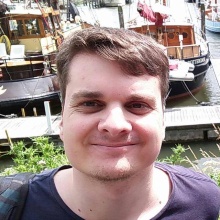Kontakt
Sprechstunde
Nach Vereinbarung per E-Mail.
Fachgebiet
Ich bin Doktorand im Projekt QuaDramA. Ich arbeite an NLP-Tools, die auf literarische und insbesondere dramatische Texte angewendet werden. Desweiteren entwickele ich Annotationsschemata für Koreferenz und Informationsstatus auf dramatischen Texten.
2020
- J. Pagel and N. Reiter, “GerDraCor-Coref: A Coreference Corpus for Dramatic Texts in German,” in Proceedings of the Language Resources and Evaluation Conference (LREC), May 2020, pp. 55–64. [Online]. Available: http://www.lrec-conf.org/proceedings/lrec2020/pdf/2020.lrec-1.7.pdf
- N. Wiedmer, J. Pagel, and N. Reiter, “Romeo, Freund des Mercutio: Semi-Automatische Extraktion von Beziehungen zwischen dramatischen Figuren,” in Book of Abstracts of DHd, C. Schöch, Ed., Mar. 2020, pp. 194–200. doi: 10.5281/zenodo.3666690.
- M. Willand, B. Krautter, J. Pagel, and N. Reiter, “Passive Präsenz tragischer Hauptfiguren im Drama,” in Book of Abstracts of DHd, C. Schöch, Ed., Mar. 2020, pp. 177–181. doi: 10.5281/zenodo.3666690.
- J. Pagel, N. Reiter, I. Rösiger, and S. Schulz, “Annotation als flexibel einsetzbare Methode,” in Reflektierte Algorithmische Textanalyse. Interdisziplinäre(s) Arbeiten in der CRETA-Werkstatt, N. Reiter, A. Pichler, and J. Kuhn, Eds., Berlin: De Gruyter, 2020, pp. 125–142. doi: 10.1515/9783110693973-006.
- N. Reiter, G. Kremer, K. Jung, B. Krautter, J. Pagel, and A. Pichler, “Reaching out: Interdisziplinäre Kommunikation und Dissemination,” in Reflektierte Algorithmische Textanalyse. Interdisziplinäre(s) Arbeiten in der CRETA-Werkstatt, N. Reiter, A. Pichler, and J. Kuhn, Eds., Berlin: De Gruyter, 2020, pp. 467–484. doi: 10.1515/9783110693973-019.
- N. Ketschik, B. Krautter, S. Murr, J. Pagel, and N. Reiter, “Vom Phänomen zur Analyse - ein CRETA-Workshop zur reflektierten Operationalisierung in den DH,” in Digital Humanities im deutschsprachigen Raum 2020., 2020, pp. 52–55. doi: 10.5281/zenodo.3666690.
- B. Krautter, J. Pagel, N. Reiter, and M. Willand, “„Ein Vater, dächte ich, ist doch immer ein Vater“. Figurentypen und ihre Operationalisierung,” Zeitschrift für digitale Geisteswissenschaften, vol. 5, Art. no. 7, Dec. 2020, doi: 10.17175/2020_007.
2019
- P. Dhar, J. Pagel, and L. van der Plas, “Measuring the compositionality of noun-noun compounds over time.,” in Proceedings of the 1st International Workshop on Computational Approaches to Historical Language Change 2019, Aug. 2019, pp. 234–239. doi: 10.18653/v1/W19-4729.
- B. Krautter and J. Pagel, “Klassifikation von Titelfiguren in deutschsprachigen Dramen und Evaluation am Beispiel von Lessings „Emilia Galotti“,” in Book of Abstracts of DHd, Frankfurt am Main, Germany, Mar. 2019, pp. 160–164. doi: 10.18419/opus-10365.
2018
- J. Pagel and I. Rösiger, “Towards bridging resolution in German: Data analysis and rule-based experiments,” in Proceedings of the Workshop on Computational Models of Reference, Anaphora, and Coreference (CRAC), New Orleans, LA, USA, Jun. 2018, pp. 50–60. doi: 10.18653/v1/W18-0706.
- N. Reiter, B. Krautter, J. Pagel, and M. Willand, “Detecting Protagonists in German Plays around 1800 as a Classification Task,” in Book of Abstracts of the European Association for Digital Humanities (EADH), Dec. 2018. doi: 10.18419/opus-10162.
- J. Pagel, N. Reiter, I. Rösiger, and S. Schulz, “A Unified Text Annotation Workflow for Diverse Goals,” in Proceedings of the Workshop for Annotation in Digital Humantities (annDH), S. Kübler and H. Zinsmeister, Eds., Sofia, Bulgaria, Aug. 2018, pp. 31–36. [Online]. Available: http://ceur-ws.org/Vol-2155/pagel.pdf
- B. Krautter, J. Pagel, N. Reiter, and M. Willand, “Titelhelden und Protagonisten - Interpretierbare Figurenklassifikation in deutschsprachigen Dramen,” LitLab Pamphlets, vol. 7, Nov. 2018, [Online]. Available: https://www.digitalhumanitiescooperation.de/wp-content/uploads/2018/12/p07_krautter_et_al.pdf
- WiSe 2019/2020:
- Übung: Computerlinguistische Methoden für die Digital Humanities (zusammen mit Gabriella Lapesa)
- SoSe 2019:
- Projektarbeit: Erkennung narrativer Anteile in Figurenrede (zusammen mit Nils Reiter)
- seit April 2018:
- Doktorand am Institut für Maschinelle Sprachverarbeitung, Universität Stuttgart
- Februar bis Juli 2017:
- ERASMUS+ Auslandssemester, Universität von Amsterdam
- 2015 - 2018:
- Studium der Computerlinguistik, Master of Science, Universität Stuttgart
- 2012 - 2015:
- Studium der Linguistik und Germanistik, Bachelor of Arts, Ruhr-Universität Bochum
Key-ID: 1742C5D7
Fingerprint: 2AF4 BFAC 3E33 CF1D C83C CE65 B44F 20A6 1742 C5D7
Public key: 1742C5D7_pub.asc


